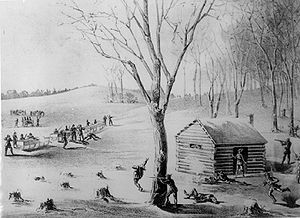- Battle of Duck Lake
-
Battle of Duck Lake Part of the North-West Rebellion 
This contemporary illustration of the Battle of Duck Lake offers a romanticized depiction of the skirmish.Date March 26, 1885 Location Duck Lake, south of Prince Albert, Saskatchewan Result Métis victory Belligerents Provisional Government of Saskatchewan (Métis) Dominion of Canada Commanders and leaders Gabriel Dumont Leif Crozier Strength 150-200 90 Casualties and losses 6 dead 12 dead
11 woundedDuck Lake – Battleford – Frog Lake – Fort Pitt – Fish Creek – Cut Knife – Batoche – Frenchman's Butte – Loon LakeThe Battle of Duck Lake was a skirmish between Métis soldiers of the Provisional Government of Saskatchewan and Canadian government forces that signalled the beginning of the North-West Rebellion.
Contents
Prelude
On March 25 a group of Métis and First Nations warriors under Louis Riel and Gabriel Dumont seized the contents of Hillyard Mitchell's store at Duck Lake. North-West Mounted Police superintendent Leif Crozier had received warning that Riel and Dumont were going to make such a move, and had sent a small force in order to get provisions from the store. The Mounties were unaware that Riel's forces were already present, and retreated back to Fort Carlton in the face of the rebel's superior numbers. Crozier then decided to return to Duck Lake with a much larger force of policemen and Prince Albert Volunteers, along with a seven-pounder cannon. Dumont in the meantime decided to set up an ambush for Crozier some 3.5 kilometres from the store.
The battle
The forces met the following day. Driven back by Métis scouts, Crozier's column huddled into a forest under cover of their sleighs while Dumont's men set camp in a nearby cabin. Dumont's forces began to encircle the police and volunteers from heavily wooded positions.
Both leaders sent representatives to negotiate the standoff, but a brawl erupted, and the Métis envoys, among them Dumont's brother, were killed by gunshot. After the brawl, Crozier's men were ordered to attack.
Despite their superior firepower, the Canadian militia elected to charge the enemy cabin, wading into the deep snow. Under heavy fire from Métis snipers, the attack foundered and Crozier sounded a retreat. Being caught in exposed open country, the Prince Albert Volunteers suffered the bulk of the casualties. Gabriel Dumont was injured when a bullet grazed his head, and despite his urgings to finish off the retreating Canadian column, Louis Riel intervened and urged that no more blood be shed.
Aftermath
The Canadian forces retreated to Fort Carlton, which they soon hastily abandoned for Prince Albert, where they sat out the remainder of the conflict.
Legacy
"Duck Lake Battlefield—Here, on 26th March, 1885, occurred the first combat between the Canadian Government Forces, under Major L.N.F. Crozier, and th Metis and Indians, under Gabriel Dumont. Ici, le 26 mars, 1885, eut lieu la première rencontre entre les troupes du gouvernement du Canada, commandées par le Major Crozier, et les Métis et Indiens commandés par Gabriel Dumont."
National Historic Sites and Monuments Board[1]In the spring of 2008, Tourism, Parks, Culture and Sport Minister Christine Tell proclaimed in Duck lake, that "the 125th commemoration, in 2010, of the 1885 Northwest Resistance is an excellent opportunity to tell the story of the prairie Métis and First Nations peoples' struggle with Government forces and how it has shaped Canada today."[2]
Duck Lake is home to the Duck Lake Historical Museum and the Duck Lake Regional Interpretive Centre, and murals which reflect the history of the rebellion in the area. The Battle of Duck Lake, the Duck Lake Massacre, and a buffalo jump are all located here. The "First Shots Cairn" was erected on Saskatchewan Highway 212 as a landmark commemorating the scene of the first shots in the Battle of Duck Lake. The Our Lady of Lourdes Shrine at St. Laurent north of Duck Lake is a local pilgrimage site.[3][4][5][6]
See also
- Northwest Rebellion
- Provisional Government of Saskatchewan
- Prince Albert Volunteers
- North-West Mounted Police
References
- ^ "Duck Lake Battlefield Plaque The Virtual Museum of Métis History and Culture". Gabriel Dumont Institute of Native Studies and Applied Research. http://www.metismuseum.ca/resource.php/04282. Retrieved 2009-09-20.
- ^ "Tourism agencies to celebrate the 125th anniversary of the Northwest Resistance/Rebellion". Home/About Government/News Releases/June 2008. Government of Saskatchewan. June 7, 2008. http://www.gov.sk.ca/news?newsId=3ceddf25-86ef-4433-86ea-cfe3cc69472d. Retrieved 2009-09-20.
- ^ "History of Duck Lake and Area". Duck Lake Regional Interpretive Centre. http://www.dlric.org/history.html. Retrieved 2009-09-20.
- ^ "Attractions and Tourism: Town of Duck Lake, Saskatchewan". M.R. Internet. Town of Duck Lake. 2007. http://ducklake.ca/visiting/attractions.php. Retrieved 2009-09-20.
- ^ McLennan, David (2006). "Duck Lake: The Encyclopedia of Saskatchewan". Canadian Plains Research Center University of Regina. http://esask.uregina.ca/entry/duck_lake.html. Retrieved 2009-09-20.
- ^ "Battleford, Batoche & Beyond Tour along the Yellowhead Highway". Yellowhead It! Travel Magazine. Yellowhead Highway Association. http://www.yellowheadit.com/saskatchewan/tours/battleford_batoche_and_beyond.php. Retrieved 2009-09-20.
Categories:- Battles of the North-West Rebellion
- National Historic Sites in Saskatchewan
Wikimedia Foundation. 2010.

